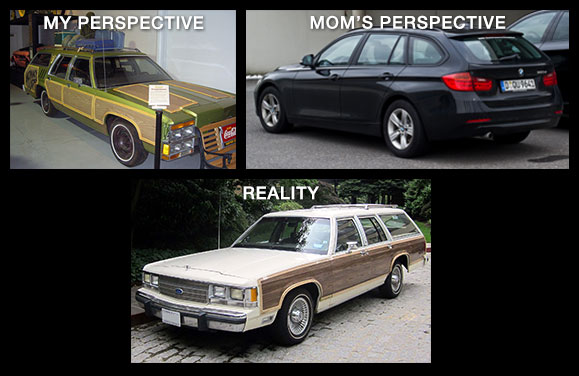
A year ago, my wife and I stepped back from our faith tradition. For us, the reasons are valid. Others may disagree. We all see the same things through different lenses. Although we shouldn’t expect everyone else to share our opinions or worldviews, we can hope for mutual respect. Where respect is lacking, we often feel misjudged.
One of the most disturbing things I’ve seen during the past year is that both extremes try to label the other: “Brainwashed vs. Apostate,” “Wheat vs. Tares,” and “Sheeple vs. Servants of Satan.” Both sides attempt to paint the other as lost, unfeeling, misguided, or unintelligent. Reality shows that your experience is not my experience, but that doesn’t mean we don’t share a broader sense of principles, ethics, moral values, and above all, humanity.
In the early phase of my faith transition, I cared more about knowing the cold, hard Truth (with a capital T) than maintaining loyalty to a particular tradition. Now, I see that traditions and community do matter. If the point of life is to serve others, cultivate relationships, and be happy, then faith traditions can help make that happen.
Growing up, our family drove a Ford Country Squire station wagon. From my perspective, it wasn’t unlike the Griswold’s Wagon Queen Family Truckster, but from my mom’s viewpoint it might as well have been a BMW. Within that vehicle, there were many Speak & Spell marathons, dead-arms, and silent treatments. There were also great conversations and fond memories. Though I may not have chosen that car or appreciated it in the same way Mom did, it was ours.
To those on the outside, our particular religious vehicle may appear strange or undesirable. Unless you’ve ridden in a vehicle with passengers you love, it’s hard to understand the appeal. Sometimes, religions (and people) need maintenance and repairs. Despite all the drawbacks of our family wagon, I ask myself: “During a storm, would you rather have walked or ridden in the car?”

If churches didn’t exist, would we make the same effort to know and serve our neighbors? Would we be aware of needs within our community? Would our kids have a safe place to play basketball? Secular groups can be good at bringing people together, but there is something unique about a community that shares a common bond and vision of becoming more Christ-like.
I grew up in a small town called Roosevelt. Whenever I see someone from Roosevelt, I feel a sense of familiarity and comfort. If I’m in a strange place and meet someone from the same faith tradition, it’s like meeting a person from the same small town. Even if we differ in our level of orthodoxy, we share a common vocabulary and heritage. It is no small thing to have a sense of global community. Sadly, some of us have been unable to remain within the faith community we love and still feel true to our inner voice.
In 2013, Dieter Uchtdorf, a leader in the LDS Church, said the following:
…there are some who leave the Church they once loved.
Sometimes we assume it is because they have been offended or lazy or sinful. Actually, it is not that simple. In fact, there is not just one reason that applies to the variety of situations.
Some of our dear members struggle for years with the question whether they should separate themselves from the Church.
In this Church that honors personal agency so strongly, that was restored by a young man who asked questions and sought answers, we respect those who honestly search for truth. It may break our hearts when their journey takes them away from the Church we love and the truth we have found, but we honor their right to worship Almighty God according to the dictates of their own conscience, just as we claim that privilege for ourselves.
The decision to step back from my faith tradition has been the hardest thing I’ve ever done. This church is where I blessed my children, married my wife, adopted my son, and developed so many meaningful relationships. The transition has been difficult, but there have also been positives.
When writing fiction, one of the dangers is making your protagonist too perfect. The problem is that we are all deeply flawed and can’t relate to characters who are not. When we dare take off the mask of perfection and express vulnerability, others usually reciprocate. Walls disintegrate and we rejoice. We accept each other unconditionally, and develop a kinship between believers, atheists, agnostics, and anyone in between. As invisible barriers disappear, we gain mutual respect and an acknowledgement that none of us have all the answers.
Some days have been extraordinarily painful, but despite the discomfort of a changing worldview, I would not trade this past year. I have a greater wonder and curiosity at the universe. I recognize more often that each moment I have with loved ones is a gift.
My wife and I believe we’re doing what’s best for our family. You could even call it a leap of faith. Where our family ultimately lands is an open question. We don’t preclude any possibility. People change and so do institutions. For now, we’re content to walk along the road. At some point, we may get in a vehicle again. It might even be a station wagon instead of a BMW. Maybe the type of vehicle doesn’t matter nearly as much as the people we’re traveling with.
 About Bryan Bostick
About Bryan Bostick
Bryan Bostick is an occasional writer. He is a work from home dad and resides in Utah.
Family Truckster by Adam Lautenbach – Flickr, CC BY 2.0, Wikimedia.org
BMW 320d Touring by M 93, CC BY-SA 3.0 de, Wikimedia.org
Ford LTD Country Squire by IFCAR – Own work, Public Domain, Wikimedia.org
Leave a Reply